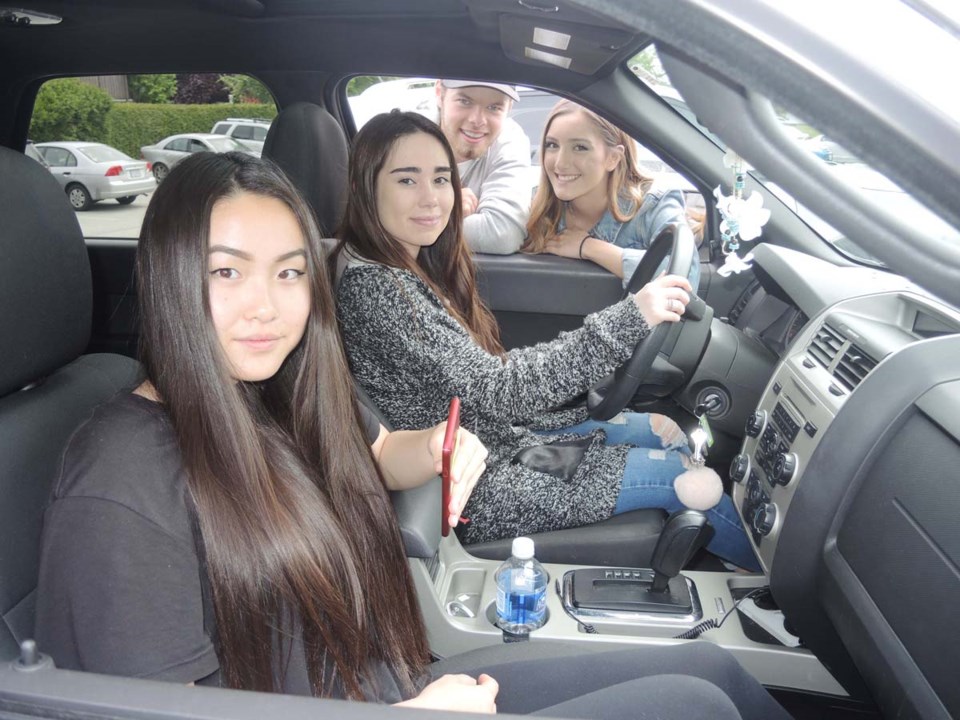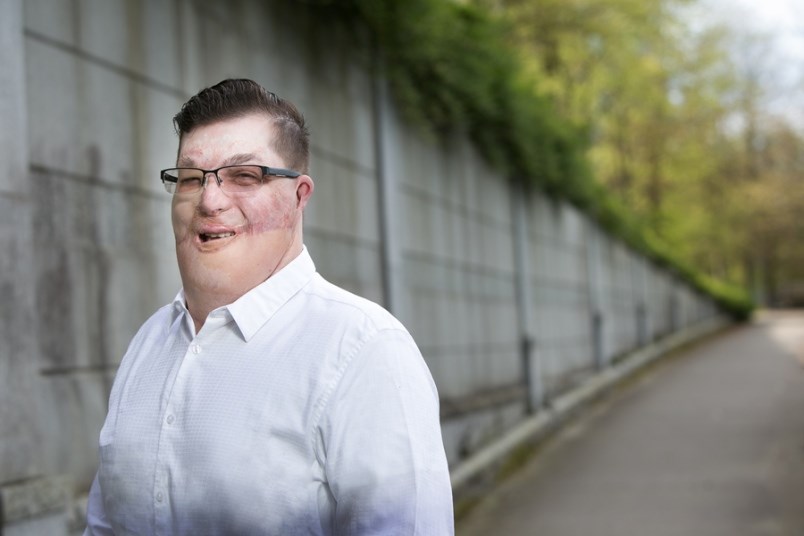They’ve heard it all before.
“Don’t drink and drive.” “Wear your seatbelt.” “Put your phone away when behind the wheel.” Etc. etc.
For many in the 500-strong crowd of Grade 11 and 12 McMath secondary students, however, there was something markedly different about Wednesday.
This time, the person dishing out the unsolicited advice to the teenagers — many of whom were learner and novice drivers — was more than qualified to lecture and had the scars to prove it.
John Westhaver was the sole survivor of a horrific traffic accident 23 years ago in a small community in New Brunswick.
Westhaver was an 18-year-old passenger that fateful day, just a couple of months before he and the two other Grade 12 occupants were due to graduate from high school.
He suffered severe burns in the crash, which was caused by the speed of the 17-year-old, sober, driver, who died. Westhaver wasn’t wearing a seatbelt.
One of the two others who lost their lives was Westhaver’s best friend.
He, in part, blames himself for drinking alcohol and, therefore, not being aware enough to tell the younger driver to slow down.
During his presentation — he is contracted by ICBC to give talks to schools on request — Westhaver, now 41, told the students what it was like to wake up from a coma, as a burn survivor, and then find out three of his friends have been killed.
It was only then that, according to some of the McMath students, the attention of Wednesday’s audience was genuinely arrested.
One of them, Chris Cook, said at that very moment during the talk, his mind drifted to the parties he’s attended and seeing people consuming alcohol and jumping into cars as passengers.
But it was a more acute vision of losing friends in such a tragic scenario that shook the conscience of Grade 12 student Chris.
“If you knew their parents and had to go and see them afterwards; you made it, but your friends didn’t,” Chris told the Richmond News, after listening to Westhaver.
“I thought about what it would feel like, going up to my friend’s parents and speaking to them. I would know how my parents might feel.”

Fellow Grade 12 student Michelle Murry added that it “would be devastating to be a part of that and be the only one walking away; you get to live your life, but they don’t.”
Chris, as with his classmates, felt the difference between second-hand accounts of the dangers of driving and seeing and hearing it first-hand, from those still living the nightmare.
“Hearing it (first-hand) was really important; rather than someone talking about it from someone else’s point of view,” said Chris, a novice driver who passed his test more than a year ago.
“It’s the first time I’ve heard from someone who has lived through it and who’s also bearing the scars.
“I knew it was going to be about drunk driving and road safety, but that was all. It showed how real it actually is and how it could happen.”
Erica Liu, also an N-plate driver, agreed that many among the large crowd in the McMath gym hall “weren’t super engaged” at the beginning.
“But when he got into the details of how he got injured and how his friends didn’t survive the accident…it changed,” she said. “He told us the brutal details.”
Haley Aitken, who only got her novice licence in March, said she would never have considered drinking and driving, even before Wednesday’s presentation.
“But what I also thought of was eating (while driving) and anything that’s dangerous really,” she added.
Even though she’s been getting behind the wheel since last June, Michelle said the talk woke her up to the responsibilities of a passenger, especially while accompanying an inexperienced driver.
“I think I’ll be more aware of my friends who are driving and maybe not be shouting and definitely not drinking, even if I’m not the one who’s driving,” she said. “Just make good choices and think about the consequences.”
Alcohol aside, one of the emerging dangers, for young drivers especially, is distracted driving, namely cellphones.
The News asked how the students cope with the temptation to pick up the device that most of them have grown up with attached to their hips
“I get the passenger to answer the phone; they keep me up to date,” said Chris. “But even then, it can still be distracting.
“When I’m alone…I’m pretty good at not looking at it.”
Haley, meanwhile, takes no chances at all.
“I put mine in the back seat, so it doesn’t distract me,” she said.
“It’s my instinct to look and see who’s calling, so I put it in the back seat, the temptation is too much.”
Erica has hers on silent and flipped over, so she can’t see who’s calling.
Michelle said, even if the phone buzzes while it’s next to her, she doesn’t look at it.
“If it’s my parents (calling or texting), they would rather I don’t answer. I don’t get a huge amount of calls anyway, so it’s all good,” she said.
The day is etched in his mind
It was April 29, 1994.
The date, understandably, is etched into the mind of John Westhaver.
Unfortunately, the consequences of that day in the small New Brunswick community of St. Stephen are also imprinted on Westhaver’s face.
“Three of us were due to graduate that year. Only one did. Me.”
Westhaver was 18 at the time, about to turn 19, as were two of the other passengers – one of whom was his best friend.

The 17-year-old driver was going too fast. They crashed and Westhaver, although being the sole survivor, was severely burned and scarred for life.
He endured countless surgeries and suffered the loss of three friends.
In 2002, he started speaking publicly about the tragedy and has now done more than 600 talks in that time, speaking to tens of thousands of students and is contracted by ICBC to speak to high schools that sign up for his presentation, as part of its Roadsense Speaker series.
Earlier this week, Westhaver, now 41 and living in Victoria, won the Coast Mental Health Courage to Come Back Award in the Physical Rehabilitation category in Vancouver.
Before speaking to the McMath students, he told the News that his message to students is that they have choices to make as they get older.
And with grad season just around the corner, he tries his best to impress upon the teenagers that the decisions they make “affect everybody in your life.”
“When something like this happens, you can’t undo it, you can’t just say sorry, it’s too late,” he said.
“The choices? Speeding, street racing, drinking, distracted driving, wearing a seatbelt; these are the choices they have to make.
“I chose to drink that night, I chose to get into that car, I chose not to wear a seatbelt. Every choice I made that night affected the outcome.
“If I didn’t drink alcohol that night, could I have told the 17-year-old driver he was driving too fast? My choices were impacted by alcohol.”
As for the consequences, Westhaver, referring to his burn scars, said the impacts are obvious, adding how he “shares with them how it changed my life, living with the scars and losing my friends.”
According to ICBC, on average, 12 youth (aged 16 to 21) are killed in crashes each year in the Lower Mainland.Young male drivers (aged 16 to 21) were involved in crashes more often than young female drivers (aged 16 to 21), particularly when speed or impairment was involved.



